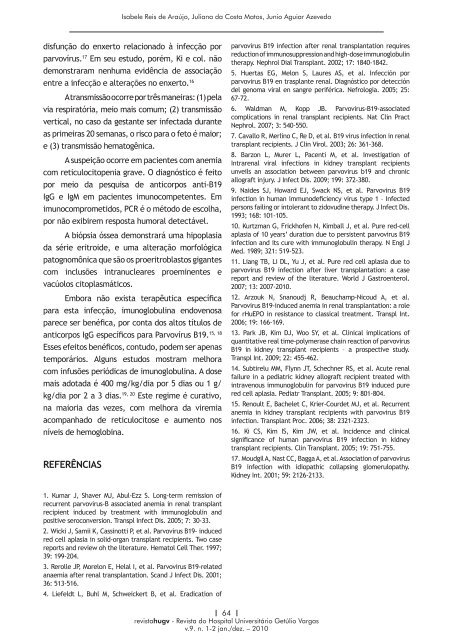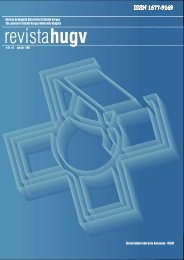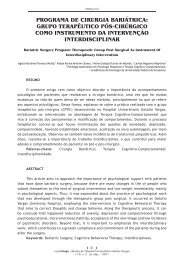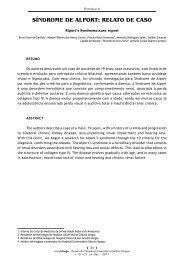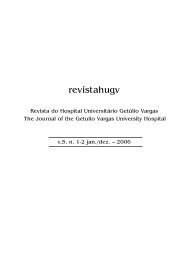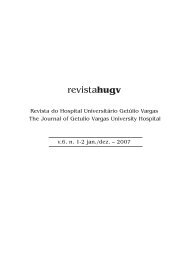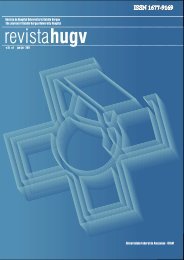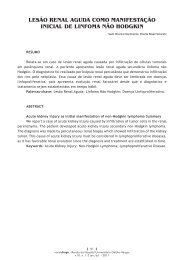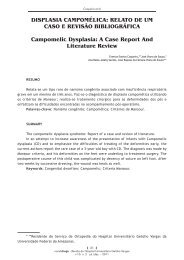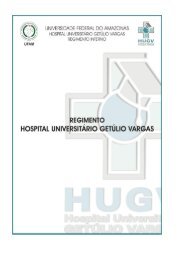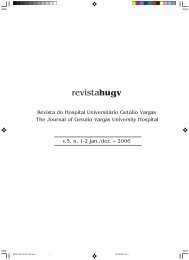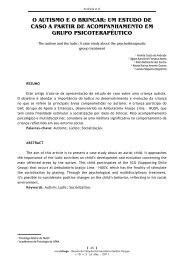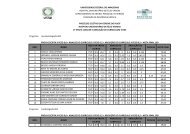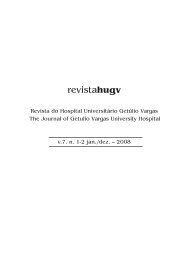Revista HUGV 2010 - Hospital Universitário Getúlio Vargas - Ufam
Revista HUGV 2010 - Hospital Universitário Getúlio Vargas - Ufam
Revista HUGV 2010 - Hospital Universitário Getúlio Vargas - Ufam
You also want an ePaper? Increase the reach of your titles
YUMPU automatically turns print PDFs into web optimized ePapers that Google loves.
Isabele Reis de Araújo, Juliana da Costa Matos, Junio Aguiar Azevedo<br />
disfunção do enxerto relacionado à infecção por<br />
parvovírus. 17 Em seu estudo, porém, Ki e col. não<br />
demonstraram nenhuma evidência de associação<br />
entre a infecção e alterações no enxerto. 16<br />
A transmissão ocorre por três maneiras: (1) pela<br />
via respiratória, meio mais comum; (2) transmissão<br />
vertical, no caso da gestante ser infectada durante<br />
as primeiras 20 semanas, o risco para o feto é maior;<br />
e (3) transmissão hematogênica.<br />
A suspeição ocorre em pacientes com anemia<br />
com reticulocitopenia grave. O diagnóstico é feito<br />
por meio da pesquisa de anticorpos anti-B19<br />
IgG e IgM em pacientes imunocompetentes. Em<br />
imunocomprometidos, PCR é o método de escolha,<br />
por não exibirem resposta humoral detectável.<br />
A biópsia óssea demonstrará uma hipoplasia<br />
da série eritroide, e uma alteração morfológica<br />
patognomônica que são os proeritroblastos gigantes<br />
com inclusões intranucleares proeminentes e<br />
vacúolos citoplasmáticos.<br />
Embora não exista terapêutica específica<br />
para esta infecção, imunoglobulina endovenosa<br />
parece ser benéfica, por conta dos altos títulos de<br />
15, 18<br />
anticorpos IgG específicos para Parvovírus B19.<br />
Esses efeitos benéficos, contudo, podem ser apenas<br />
temporários. Alguns estudos mostram melhora<br />
com infusões periódicas de imunoglobulina. A dose<br />
mais adotada é 400 mg/kg/dia por 5 dias ou 1 g/<br />
kg/dia por 2 a 3 dias. 19, 20 Este regime é curativo,<br />
na maioria das vezes, com melhora da viremia<br />
acompanhado de reticulocitose e aumento nos<br />
níveis de hemoglobina.<br />
REFERÊNCIAS<br />
parvovirus B19 infection after renal transplantation requires<br />
reduction of immunosuppression and high-dose immunoglobulin<br />
therapy. Nephrol Dial Transplant. 2002; 17: 1840-1842.<br />
5. Huertas EG, Melon S, Laures AS, et al. Infección por<br />
parvovirus B19 en trasplante renal. Diagnóstico por detección<br />
del genoma viral en sangre periférica. Nefrologia. 2005; 25:<br />
67-72.<br />
6. Waldman M, Kopp JB. Parvovirus-B19-associated<br />
complications in renal transplant recipients. Nat Clin Pract<br />
Nephrol. 2007; 3: 540-550.<br />
7. Cavallo R, Merlino C, Re D, et al. B19 virus infection in renal<br />
transplant recipients. J Clin Virol. 2003; 26: 361-368.<br />
8. Barzon L, Murer L, Pacenti M, et al. Investigation of<br />
Intrarenal viral infections in kidney transplant recipients<br />
unveils an association between parvovirus b19 and chronic<br />
allograft injury. J Infect Dis. 2009; 199: 372-380.<br />
9. Naides SJ, Howard EJ, Swack NS, et al. Parvovirus B19<br />
infection in human immunodeficiency virus type 1 – Infected<br />
persons failing or intolerant to zidovudine therapy. J Infect Dis.<br />
1993; 168: 101-105.<br />
10. Kurtzman G, Frickhofen N, Kimball J, et al. Pure red-cell<br />
aplasia of 10 years’ duration due to persistent parvovirus B19<br />
infection and its cure with immunoglobulin therapy. N Engl J<br />
Med. 1989; 321: 519-523.<br />
11. Liang TB, Li DL, Yu J, et al. Pure red cell aplasia due to<br />
parvovirus B19 infection after liver transplantation: a case<br />
report and review of the literature. World J Gastroenterol.<br />
2007; 13: 2007-<strong>2010</strong>.<br />
12. Arzouk N, Snanoudj R, Beauchamp-Nicoud A, et al.<br />
Parvovirus B19-induced anemia in renal transplantation: a role<br />
for rHuEPO in resistance to classical treatment. Transpl Int.<br />
2006; 19: 166-169.<br />
13. Park JB, Kim DJ, Woo SY, et al. Clinical implications of<br />
quantitative real time-polymerase chain reaction of parvovirus<br />
B19 in kidney transplant recipients – a prospective study.<br />
Transpl Int. 2009; 22: 455-462.<br />
14. Subtirelu MM, Flynn JT, Schechner RS, et al. Acute renal<br />
failure in a pediatric kidney allograft recipient treated with<br />
intravenous immunoglobulin for parvovirus B19 induced pure<br />
red cell aplasia. Pediatr Transplant. 2005; 9: 801-804.<br />
15. Renoult E, Bachelet C, Krier-Courdet MJ, et al. Recurrent<br />
anemia in kidney transplant recipients with parvovirus B19<br />
infection. Transplant Proc. 2006; 38: 2321-2323.<br />
16. Ki CS, Kim IS, Kim JW, et al. Incidence and clinical<br />
significance of human parvovirus B19 infection in kidney<br />
transplant recipients. Clin Transplant. 2005; 19: 751-755.<br />
17. Moudgil A, Nast CC, Bagga A, et al. Association of parvovirus<br />
B19 infection with idiopathic collapsing glomerulopathy.<br />
Kidney Int. 2001; 59: 2126-2133.<br />
1. Kumar J, Shaver MJ, Abul-Ezz S. Long-term remission of<br />
recurrent parvovirus-B associated anemia in renal transplant<br />
recipient induced by treatment with immunoglobulin and<br />
positive seroconversion. Transpl Infect Dis. 2005; 7: 30-33.<br />
2. Wicki J, Samii K, Cassinotti P, et al. Parvovirus B19- induced<br />
red cell aplasia in solid-organ transplant recipients. Two case<br />
reports and review oh the literature. Hematol Cell Ther. 1997;<br />
39: 199-204.<br />
3. Rerolle JP, Morelon E, Helal I, et al. Parvovirus B19-related<br />
anaemia after renal transplantation. Scand J Infect Dis. 2001;<br />
36: 513-516.<br />
4. Liefeldt L, Buhl M, Schweickert B, et al. Eradication of<br />
64<br />
revistahugv - <strong>Revista</strong> do <strong>Hospital</strong> Universitário Getúlio <strong>Vargas</strong><br />
v.9. n. 1-2 jan./dez. – <strong>2010</strong>


